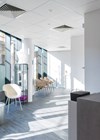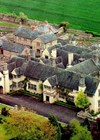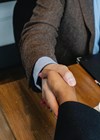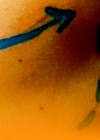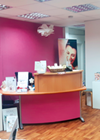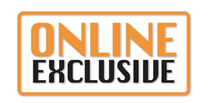
We were delighted to catch up with Naveen Cavale, Consultant Plastic Surgeon and President of the RSM Section of Plastic Surgery.
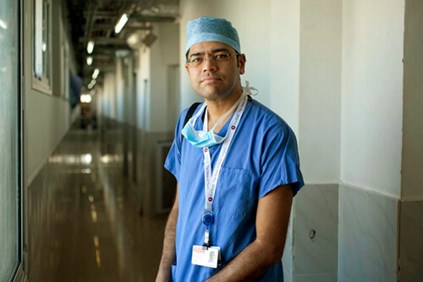
Can you tell us a little bit about what led you into the field of plastic surgery?
A bit of general background first, if that’s ok. I knew I wanted to be a doctor from a very early age – I come from several generations of doctors – my late father and grandfather were GPs, my great grandfather was a surgeon, and I am told by various family elders that there were three further generations of ‘medicine men’, ‘traditional medics’ or whatever, before them.
I also knew I didn’t want to be a GP throughout my time at UCL Med School, because I’d watched my dad struggle a bit with that – he said he originally wanted to be a surgeon, but was forced to take up general practice because it came with better family accommodation, so once I arrived, he switched over!
I decided on plastics once I did my very first job as a doctor – I was House Officer, in plastics, at The Middlesex Hospital (tragically demolished now), working for Prof McGrouther, Brian Morgan, and the late Mike Brough – my time with them is still one of the best jobs I’ve ever done as a doctor. The variety of cases was great, I got to do loads as a junior, in theatre, on the wards, and everyone in the team seemed to be loving what they were doing. Not all other units I worked in after that were quite so much fun to be in, but I persevered, thinking that I’d one day like to emulate the atmosphere and spirit at The Middlesex. And I do think we have something similar at King’s College Hospital, where I have been a Consultant since 2011.
What one paper or book would you recommend every plastic surgeon should read?
Easy choice here – The Principles and Art of Plastic Surgery by Sir Harold Gillies and D Ralph Millard Jr published in 1957.
This is an amazing book – I happen to own the copy that Gillies gifted to McIndoe, I didn’t realise it was that copy when I bought it! It is not just a textbook of plastic surgery, it’s a manual on how to live a good life in plastic surgery. One of my previous bosses, Miki Pohl, now in Melbourne, put me on to it when I was a junior reg, around the time I got my training number, in 2004.
Compulsory reading for every potential plastic surgeon, be they a med student, trainee or a consultant.
It must have been a huge honour to be invited to become President of the RSM Plastic Surgery Section. Are you enjoying this role and what have been your main aims?
It is a great honour, yes. I had been on the Council for ages, and the RSM has always championed the cause of learning in plastic surgery, particularly for trainee plastic surgeons. It has always been a good ‘entry point’ for such trainees who want to start presenting at a national level. It also has an amazing pedigree, with some huge names gracing the logbook for attendees at Council meetings. So, yes, very big shoes to fill!
However, of late, with rotas becoming more and more rigid and shift patterns not necessarily the most flexible for training, the RSM has struggled to attract the same level of trainees to meetings. I must say that I have struggled to change this to any significant degree over the last few months since becoming president.
But, I am hoping that this can be an area where the recent coronavirus crisis can bring about some good change. Pretty much all face to face meeting planned for 2020 has been cancelled. We are now in the process of converting them to webinars, and the RSM has an amazing facility that can accommodate up to 3000 delegates online.
Having sat through some truly inspiring webinars organised by plastics associations such as ISAPS, BAAPS and The Rhinoplasty Society of Europe, I think combined face-to-face / online meetings are going to be the way forward for the RSM’s meetings, for the foreseeable future
Of course, the current COVID-19 pandemic has made life very different for everyone; how is the RSM Section supporting its members during the crisis?
We ran our first RSM webinar a couple of weeks ago, and it went very well. We now have a few more planned for this academic year and the start of the next. For example, an all-day meeting planned for May 2020, has been converted into a webinar for July, and the great thing about this format is that overheads are far less (no lunches, or glasses of wine!). So, we can make ticket costs much lower, still engage sponsors, and pass on the saving to trainees – the July webinar will be free to UK plastics deanery trainees!
We are also going to combine an orthoplastics day and a global surgery day into a similar webinar that can hopefully be made available free to orthopaedic and plastic surgeons from low / middle income countries (LMICS) – this will fit nicely into the work I do with BFIRST, the charity arm of BAPRAS, and IDEALS and MAP, the two charities I go to Gaza with. I’m hoping this will start to give the Plastics Section of the RSM a more global profile, something UK plastic surgery does lack somewhat – I’m not expecting anything major here, this will take a long time to grow, but it’s a start.
You are known for being very dedicated to training; do you see this as an important part of your work and are you continuing this virtually?
Trainees and medical students are my favourite colleagues, by far. They are just so much fun to have around. I am patron of the King’s College London Medical School Plastics Society (KCL PRASS), and the students there have been great at helping me improve my social media skills. We recently ran an ‘Instagram-Live’ interview, with questions being fired at me by the students in real time – an incredibly refreshing experience, that really kept me on my toes. We have run lecture days, suturing and basic flap workshops in the past, and I am certain these will also evolve into a web-based format of some sorts, for 2021.
And finally, if you have any spare time, how do you like to relax?
I like tinkering with gadgets (my most recent thing has been reviving old HiFi equipment and computers from the 80s and 90s).
I also cycle a lot (mainly commuting) and I have a classic car I try to keep on the road. Trouble is, in London, I don’t get much chance to drive (and my car isn’t the most environmentally friendly . . . ). I actually cycled about 2500 miles last year, and only put 500 miles on my car between MOTs. Maybe I can combine everything and convert my petrol car to electric?
I’ve always felt I’ve failed at giving my family enough time, and lockdown has been really good to see what happens when you do have time to spend with each other – I’ve promised myself that this will be something I will continue even after coronavirus is well and truly behind us.
Many thanks for your time!
https://www.rsm.ac.uk/rsm-sections/plastic-surgery-section/
http://www.bfirst.org.uk/
https://www.ideals.org.uk/
https://www.map.org.uk/
https://www.kclsu.org/organisation/15421/

